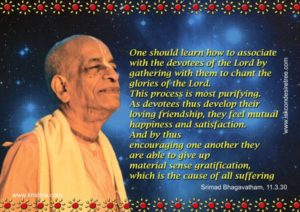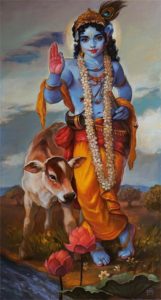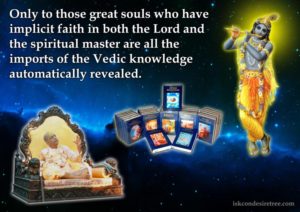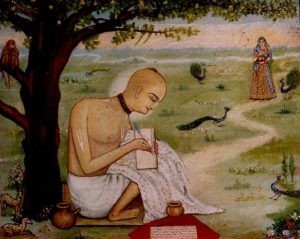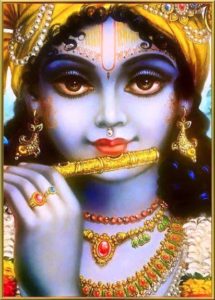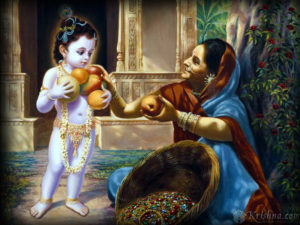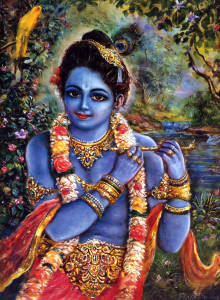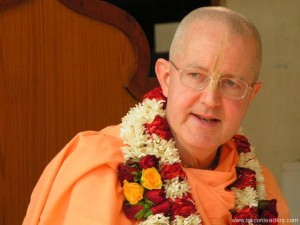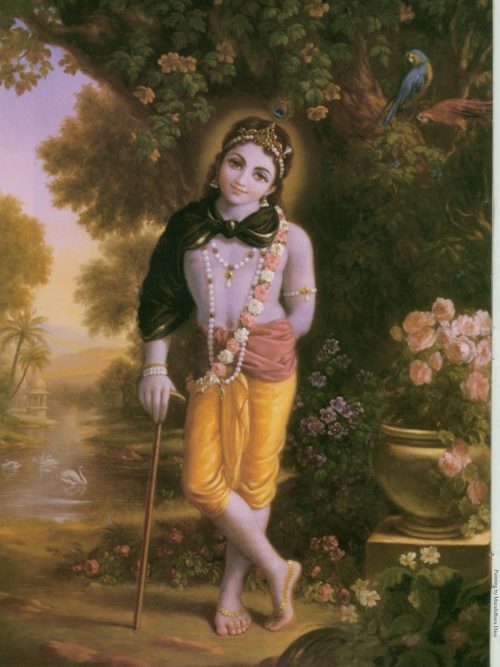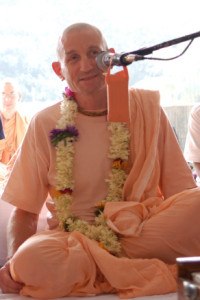Hare Krishna dear devotees,
Srila Prabhupada described Srimad Bhagavatam as the encyclopedia of spiritual life and Caitanya Mahaprabhu called it the amala purana (spotless Purana).
We all know the famous Gita Mahatamaya verse :
sarvopanishado gavo, dogdha gopala-nandanah
partho vatsah su-dhir bhokta, dugdham gitamritam mahat
All the Upanisads are like a cow, and the milker of the cow is Lord Shri Krishna, the son of Nanda. Arjuna is the calf, the beautiful nectar of the Gita is the milk, and the fortunate devotees of fine theistic intellect are the drinkers and enjoyers of that milk.
(Gita Mahatmya, verse 6)
Taking a cue from the above, if all the Upanishads are like a cow then
Srimad Bhagavatam is like a Surabhi cow, and the milker of this Surabhi cow is Śukadeva Gosvāmī. Parīkṣit’s Maharaj is the calf, the ‘rasa’ or mellow of devotional service is the milk, and the paramahaṁsas, devotees who are already on the liberated platform, are the drinkers and enjoyers of this milk.
Here is another gem from Srimad Bhagavatam
parasparānukathanaṁ
pāvanaṁ bhagavad-yaśaḥ
mitho ratir mithas tuṣṭir
nivṛttir mitha ātmanaḥ
One should learn how to associate with the devotees of the Lord by gathering with them to chant the glories of the Lord. This process is most purifying. As devotees thus develop their loving friendship, they feel mutual happiness and satisfaction. And by thus encouraging one another they are able to give up material sense gratification, which is the cause of all suffering.
(SB 11.3.30)
Let us pray to the lotus feet of Srila Prabhupada as we try to churn every line of this verse, simply by his mercy may we be blessed with just a few drops from it!
One should learn how to associate with the devotees of the Lord: To be able to progress in Krishna consciousness and proceed towards the madhyam culture, we need to associate with devotees and develop friendship with them. This is not something which comes naturally to many of us. Bhagavatam knows our conditioning, so it is directing us to ‘learn it’. Srila Bhaktivinoda Thakura says that Love for Krishna is reflected as friendship with devotees in the material world, they are two sides of the same coin. Sometimes we may excuse ourselves by saying ‘I am an introvert’ or ‘it isn’t my nature to mix with everyone’ but if we wish to make progress in spiritual journey then it is very important to develop friendship with other devotees. We can begin by regularly associating with like minded devotees. We have to shift towards our ‘real’ nature, what is practiced in Goloka.
By gathering with them to chant the glories of the Lord: What do we do when we associate with devotees? Do we share some juicy gossip, of course about the devotees only, after all we are concerned with them only or do we share some tricky temple issue, where we ourselves have no influence, or discuss some scandal or ask about the weather or family or so many other topics? Bhagavatam is saying meet and chant the glories of the Lord.
A devotee once shared how he once saw two Mathura Brahmins who met after many years. When these two Brahmins saw each other from a distance they started pacing towards each other and then as they came closer the devotee saw that both of them were reciting Bhagavatam verses loudly! The devotee said he was very surprised to witness such an interaction where instead of talking about well being, family, kids, etc. they were spontaneously reciting Bhagavatam verses one after another.
We can appreciate as the strong attachment of Brahmins to Srimad Bhagavatam came out naturally. We can’t imitate them but we can definitely take an inspiration from them and also understand that such strong attachment for Srimad Bhagvatam verses is resulting from a strong attachment to daily reading of Srimad Bhagavatam.
This process is most purifying: Our bonafide process for internal purification is Sravanam Kirtanam. This has been stressed repeatedly in Srimad Bhagavatam and hundreds of times by Srila Prabhupada in his lectures and purports. Its a very simple and yet effective process.
These nine processes, of which the easiest is çravaëam, hearing the Bhagavad-gétä from the realized person, will turn one to the thought of the Supreme Being. This will lead to remembering the Supreme Lord and will enable one, upon leaving the body, to attain a spiritual body which is just fit for association with the Supreme Lord.
(BG Introduction)
As devotees thus develop their loving friendship, they feel mutual happiness and satisfaction: Srimad Bhagavatam is again stressing that we need to develop, and cultivate, loving friendship with devotees. It may not come naturally to us in the beginning therefore we need to practice it consciously (not artificially). We will then feel satisfaction, resulting in increased mutual enthusiasm for Krishna consciousness, a feeling of satisfaction and a happiness from within.
Śrīla Viśvanātha Cakravartī Ṭhākura describes the transcendental symptom of those devotees who have developed a real taste for hearing & chanting the glories of Krishna, in the association of other devotees, in his commentary of SB 1.5.11 –
The devotees hear, and having heard, sing, and having sung, again they hear, since they are not fully satiated. Or if a speaker is present, they hear the glories. If a hearer is present they speak the glories . And, otherwise, they spontaneously sing the glories.
And by thus encouraging one another they are able to give up material sense gratification, which is the cause of all suffering: At our level, one big reason for not progressing in Krishna consciousness is not our inability to chant additional rounds, memorise more verses, and so on but simply because we still have desires (consciously or subconsciously) to enjoy this material world. We very well know that the result of all such desires will be that we come back here again and again.
Now do we know of a more easier, and simpler process, to give up sense gratification than described above? What is aimed, and rarely achieved, by big big jnanis and yogis, can be very easily, and joyfully, achieved even by aspiring devotees. Sometimes our mind may find few solutions sound too easy to be true but then we underestimate the mercy of Krishna and the potency of Srimad Bhagavatam.
The result of such association with devotees is very sweetly described in the purport of this verse –
Śrīla Viśvanātha Cakravartī Ṭhākura has pointed out that glorification of the Supreme Lord is especially potent when performed in the association of pure devotees. When devotees engage in saṅkīrtana, chanting the glories of the Lord together, they experience the highest transcendental bliss and satisfaction. Thus they encourage one another to give up material sense gratification, which is based on illicit sexual connections with women. One devotee will say to another, “Oh, you have given up sense gratification. Starting today, I shall also give it up.”
(SB 11.3.30p)
Srila Prabhupada sums up!
A place immediately becomes Vaikuṇṭha whenever the holy topics of the Personality of Godhead are discussed by pure devotees. This is the process of śravaṇaṁ kīrtanaṁ viṣṇoḥ, chanting and hearing about the Supreme Lord, Viṣṇu. As the Supreme Lord Himself confirms:
nāhaṁ tiṣṭhāmi vaikuṇṭhe
yogināṁ hṛdayeṣu vā
tatra tiṣṭhāmi nārada
yatra gāyanti mad-bhaktāḥ
“My dear Nārada, actually I do not reside in My abode, Vaikuṇṭha, nor do I reside within the hearts of the yogīs, but I reside in that place where My pure devotees chant My holy name and discuss My form, pastimes and qualities.” Because of the presence of the Lord in the form of the transcendental vibration, the Vaikuṇṭha atmosphere is evoked.
(SB 4.30.35p)
I pray that by the mercy and potency of Srila Prabhupada we can all taste some butter from this milk we tried to churn today.
All glories to Srimad Bhagavatam.
All glories to Sri Guru and Gauranga.
All glories to Srila Prabhupada.
Your servant,
Giriraj dasa

